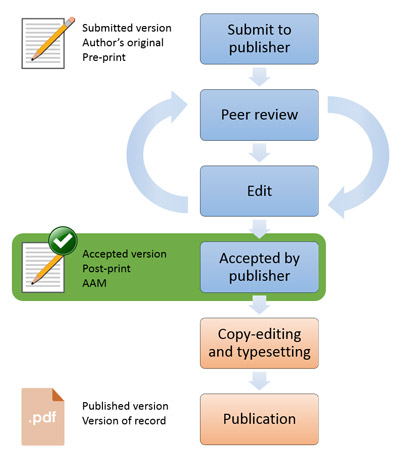Where can you publish Open Access?
Open Access Definitions
There are two routes to OA:
1. Green route
Aberystwyth University (AU) makes its research open access via the Aberystwyth Research Portal. All new Journal contributions, including Conference Proceedings published in a journal edition, should be made available through the Green OA route by depositing a postprint of your paper in PURE at the point of acceptance. Your article will then be checked and publisher embargo applied (if appropriate) before it appears in the Aberystwyth Research Portal.
AU Open Access and PURE submission policy
If you are concerned that your journal doesn’t allow you to meet UKRI and/or HEFCE/W OA requirements please get in touch with openaccess@aber.ac.uk as soon as possible.
For information the UK embargo list for Elsevier journals can be found at: https://www.elsevier.com/__data/assets/pdf_file/0011/78473/UK-Embargo-Periods.pdf .
What is a postprint (also known as the Author Accepted Manuscript)?

Below are the Open Access Scholarly Information Sourcebook’s definitions of pre-print and post-print versions of an article. These definitions will help you verify which version of your article needs to be uploaded when you create a record of the research output within PURE; our current research information system. After validation, the records are then transferred to Aberystwyth Research Portal.
A pre-print is a version of the article before it has been peer-reviewed for publication. The term may refer either to articles at an early stage of preparation or to articles at the last stage before submission for peer-review. In the latter case the article is, of course, well-developed and ready for critical review and, if only minor revisions are needed as a result of peer review, a late-stage preprint may be very little different from the final article.
A post-print/Author Accepted Manuscript is the final version of the article that the author sees before it is published. A post-print has been peer-reviewed and the changes and revisions required by the reviewers have been incorporated. It is identical to the published version except that the publisher will lay out the article in the house style, assign page numbers (if the journal is still published in print), add the publisher's logo, copyright details, and so forth. In content, however, the author's final post-print and the published version are effectively the same.
2. Gold/Hybrid Routes
As well as achieving open access via the Green Route, you can publish in a Gold journal, sometimes via an Article Processing Charge – APC, or in a hybrid journal via an APC. Gold Open Access enables a paper to be freely available to all readers on the publisher’s website without being restricted to subscribers behind a paywall. UK Research & Innovation (UKRI)'s block grant funding is occasionally available to support Gold Open Access for research derived from its funded projects. This includes funded student projects.
The full UKRI Open Access rules can be viewed at: https://www.ukri.org/manage-your-award/publishing-your-research-findings/. Please note that UKRI Open Access funding is available for publications from any UKRI funded project, including UKRI funded studentships.
UKRI required Licences
Creative Commons (CC) re-use licences provide a useful facility for asserting the range of purposes to which information or data contained in a paper can be applied.
UKRI expect the CC-BY licence to be applied to Gold Open Access articles drawing on block grant. The CC-BY licence requires acknowledgment of the original authors/creators in any new output, but there are no restrictions on commercial re-use, on creating derivatives from the original information or data, nor on the future licencing which may be applied to any derivative works.
Further details regarding the full range of Creative Commons re-use licences including more restrictive licences can be found at: https://creativecommons.org/licenses/
Transformative agreements:
Detailed information regarding Transformative Agreements can be found here
These Transformative Agreements are complex and do vary enormously. Please read your publisher correspondence carefully and contact openaccess@aber.ac.uk with any questions to avoid any personal liability for costs.
